Marketing experts widely consider content creation to be one of the most effective SEO tactics with the best ROI. Content creation leads to over 400% more indexed pages than pages without updated content. However, at its core, content must do one thing for the reader—answer their query.
Content writing is a part of nearly every type of content creation. Therefore, there is a dilution in the quality of writing that exists across the internet. Due to this, SEO content needs to rise above mediocrity and stand out. Content writers must produce content that provides in-depth information, a personal tone of voice, and an engaging narrative.
To create successful content, you need to have spot-on keyword research—zeroing in on the right phase and content that internet users search helps increase traffic flow. Next, the content you produce needs to be error-free. No misspellings, no improper grammar usage, no awkward wording, etc. Finally, to help elevate and supplement your writing, you’re going to want to use a design tool to help highlight the key elements of your blog or service page.
Here are 15 content writing tools that can help improve the quality of your writing and, as a result, boost your SEO rankings.
Table of Content Writing Tools
- Answer The Public
- Grammarly
- Canva
- Semrush
- ChatGPT
- Copy.ai
- Hemingway Editor
- Ahrefs
- SurferSEO
- Jasper
- Rytr
- Clearscope.io
- Frase
- Wordtune
- Google Search Console
Best SEO Content Writing Tools
1. Answer The Public
Answer The Public is a look into the minds of everyday internet users and the questions they ask with specific keywords. This online tool helps content creators understand what popular phrases are being used and what could be useful topics for content generation. This program gives you your root keyword or phrase and then branches off into subcategories with numerous individual questions related to that keyword. Coming up with your next popular blog topic won’t be a problem.

Pros:
- Provides valuable insights into real user queries, helping tailor content to what people are actively searching for.
- Generates numerous ideas based on one keyword, making it easier to plan multiple content pieces.
- User-friendly interface with clear visualizations of related questions and topics.
Cons:
- Limited searches available in the free version, which may restrict its usability for frequent users.
- Some results may be repetitive or irrelevant, requiring manual filtering.
2. Grammarly
Grammarly is a free writing tool that acts as your personal editor. The free version helps identify misspelled words, comma splices, incorrect word usage, and more. This tool also helps suggest more effective word choices in specific instances. Grammarly is a tool that all writers should be using, as it helps ensure your copy is clean, crisp, and accurate. A service page or blog with a bunch of errors isn’t going to win over any fans, and sure isn’t going to help your bounce rate.
This writing tool also prioritizes security in every aspect of its product, infrastructure, and operations. Their security practices are reinforced by a SOC 2 (Type 2) report, which confirms that they meet enterprise-level standards for security, privacy, availability, and confidentiality.
AI Features
Grammarly has been using AI writing assistance since 2009 and has been dedicated to ensuring responsible and innovative AI use. Their AI detection software is free and is the latest step in safeguarding user data and privacy.
Grammarly helps at every stage, from brainstorming to revising, and integrates with over 500,000 apps and sites, providing real-time feedback.
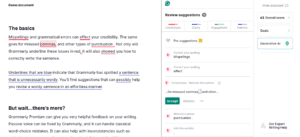
Pros:
- Excellent for catching grammar mistakes, typos, and stylistic issues, ensuring clean and polished content.
- Free version offers comprehensive editing features, making it accessible for most writers.
- Real-time suggestions and AI changes help improve sentence structure and readability.
Cons:
- Advanced suggestions (such as tone and style improvements) are locked behind a premium subscription.
- Sometimes offers overly formal suggestions, which may not suit all writing styles.
3. Canva
While Canva isn’t a writing tool, it does help content writers. SEO takes into account on-page creatives like images, infographics, etc. Also, search engines prioritize the user experience and rank pages partly based on how useful page visitors view the content. Therefore, creating content that is not only high quality in terms of the writing but also in the supplemental visual aids.
Canva is a free online design tool that enables even beginning designers to quickly create attractive and appealing visual aids. Incorporating this type of content into your blogs and service pages will help increase the user experience, and most likely your page ranking. With this tool, you can literally create content visually that sells.

Pros:
- Easy-to-use design platform, even for beginners, with a wide variety of templates and elements.
- Enhances the visual appeal of blog posts and service pages, improving user experience and engagement.
- Free version offers a generous range of design tools and features.
Cons:
- Some advanced features and premium design elements require a paid subscription.
- Not as powerful or customizable as professional design tools like Adobe Photoshop.
4. Semrush
Semrush is one of the better content optimization tools that help content creators, marketers, and SEO specialists analyze keyword rankings, track website performance, and conduct competitor research. It’s particularly useful for keyword research and monitoring how your content ranks over time. With Semrush, you can also discover long-tail keywords, perform SEO audits, and analyze backlink profiles. This tool ensures your content is optimized for search engines, helping improve rankings and drive more traffic to your website.
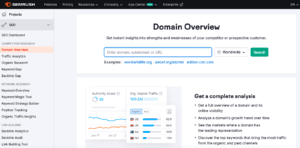
Pros:
- Offers in-depth keyword research, SEO tracking, and competitive analysis, making it a powerful all-in-one SEO tool.
- Provides insights into long-tail keywords, backlinks, and site audits, helping improve search visibility.
- Customizable reports and data allow for precise SEO monitoring.
Cons:
- The extensive features and complexity can overwhelm beginners.
- High cost, especially for small businesses or individual users, compared to some other SEO tools.
- The AI features can act as an SEO writing assistant, but they are’t perfect and require lots of oversight.
5. ChatGPT
ChatGPT is an AI-powered language model that generates human-like text based on user prompts. It can assist with content generation by drafting blog posts, product descriptions, FAQs, and more. ChatGPT is a valuable tool for brainstorming ideas, developing outlines, or even producing entire articles. Content creators can use it to quickly generate drafts, which can then be refined and optimized for SEO. This tool helps streamline the content creation process, making it faster and more efficient.

Pros:
- Quick content generation, helping to streamline idea development and writing tasks.
- Useful for brainstorming, outlining, and creating initial drafts, saving time during the writing process.
- Can generate large amounts of content across different styles and formats.
Cons:
- Generated content often requires significant editing for accuracy and personalization.
- Can sometimes produce generic or off-topic content that needs refinement for specific use cases.
- Websites that clearly use AI may be penalized on SERP.
6. Copy.ai
Copy.ai is a powerful AI writing assistant that focuses on creating compelling copy for a variety of platforms, including blogs, social media, and ads. With Copy.ai, users can input keywords or brief descriptions, and the content writing tool generates different variations of copy for them to choose from. This helps writers overcome creative blocks and produce engaging content more quickly.
It’s especially helpful for generating creative introductions, taglines, and marketing messages that resonate with audiences.

Pros:
- Helps overcome writer’s block by offering multiple variations of copy for different use cases.
- Great for generating short-form content like taglines, ads, and social media posts.
- Fast and intuitive to use, helping streamline content creation.
Cons:
- Limited customization in the free version, with many templates and features locked behind a paid plan.
- May require tweaking and editing to align with brand voice or tone.
7. Hemingway Editor
Hemingway Editor is a free writing tool that improves readability by highlighting complex sentences, passive voice, and adverbs. It offers suggestions for making your writing simpler and more concise. This tool is particularly useful for content creators who want to produce clear, straightforward copy that is easy for readers to digest. Hemingway makes your writing more readable, which helps enhance user experience and positively impacts SEO performance.
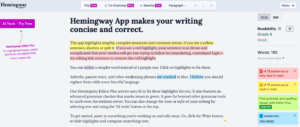
Pros:
- Improves readability by highlighting overly complex sentences and suggesting simpler alternatives.
- Helps ensure that the content is clear, concise, and easy to understand, improving user experience.
- Free to use, with a minimalistic interface that makes it straightforward to edit.
Cons:
- Limited to basic editing features without advanced grammar or stylistic checks.
- Over-reliance on its suggestions can lead to overly simplistic writing that lacks nuance.
- It is more geared toward creative writing, which may clash with the tone of tech or healthcare companies.
8. Ahrefs
Ahrefs is an all-in-one SEO toolset that allows you to analyze backlinks, research competitors, and explore content opportunities. It’s known for its extensive backlink database, which helps users understand their website’s authority and uncover potential link-building strategies. Ahrefs also offers keyword research and content analysis features, making it an excellent tool for improving search visibility and developing data-driven content strategies that rank higher on search engines.

Pros:
- Robust backlink analysis, allowing users to uncover valuable link-building opportunities.
- Comprehensive keyword research and competitor analysis features help improve content strategy.
- Powerful data visualization tools and accurate insights for SEO optimization.
Cons:
- Expensive pricing, making it less accessible for small businesses or freelancers.
- Steep learning curve for new users unfamiliar with SEO tools and techniques.
9. SurferSEO
SurferSEO is a data-driven optimization tool that helps content creators write SEO-friendly articles. Through its analysis of the top-ranking pages for your target keyword, SurferSEO offers insights into ideal word count, keyword density, and LSI keywords (related phrases).
The tool provides real-time recommendations as you write, ensuring that your content meets SEO standards and performs well on search engines. It’s perfect for those who want to optimize their content while maintaining high quality.

Pros:
- Real-time SEO recommendations based on data-driven analysis, ensuring content is optimized as it’s written.
- Helps users understand ideal keyword usage, content length, and related terms to rank better in search results.
- Intuitive interface that integrates seamlessly with content writing tools like Google Docs.
Cons:
- Paid plans are necessary for full functionality, with the free version offering limited features.
- May not suit writers who prefer less formulaic content creation processes.
10. Jasper
Jasper (formerly known as Jarvis) is an AI writing assistant that specializes in generating high-quality content for marketing, sales, and blogs. With a wide range of templates, Jasper helps users write compelling copy quickly, from social media posts to full-length articles. The AI learns from user feedback, allowing it to continuously improve the quality of its suggestions. Jasper is a great tool for scaling content production and improving efficiency without sacrificing quality.

Pros:
- Can generate high-quality content quickly for various platforms, from blogs to social media.
- Includes a wide range of templates that cater to different writing needs and industries.
- Learns from user feedback, allowing for more tailored and accurate content over time.
Cons:
- Can produce repetitive or generic results, especially if not given specific inputs.
- Subscription pricing can be high, particularly for individual users.
11. Rytr
Rytr is an AI content generator that helps users create various types of content, from emails to blog posts and product descriptions. Its user-friendly interface allows writers to choose tones and formats, and the AI crafts content based on the input. Rytr is a cost-effective solution for content creators looking to generate high-quality copy without spending too much time on writing tasks, helping streamline content production.

Pros:
- Affordable AI writing tool that generates content for emails, blogs, social media, and more.
- Provides multiple tones and formats to choose from, making it versatile for different writing needs.
- Simple and user-friendly, ideal for beginners or small-scale content creators.
Cons:
- Limited features compared to other AI writing tools, which may restrict functionality.
- The longer the generated content the more heavy editing is required.
12. Clearscope.io
Clearscope.io is a content optimization platform that integrates with Google Docs and WordPress to provide real-time SEO recommendations. It helps content creators optimize their writing by analyzing top-ranking pages and suggesting relevant keywords and phrases. Clearscope’s content grading system makes it easy to see how well your article aligns with SEO best practices, helping you produce content that ranks higher in search results.
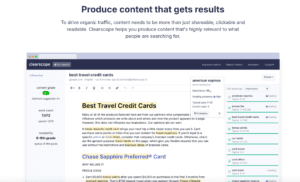
Pros:
- Provides real-time SEO recommendations and content grading, ensuring articles are optimized for search engines.
- Integrates easily with popular writing platforms like Google Docs and WordPress.
- Helps improve content relevancy by suggesting the most important related keywords and phrases.
Cons:
- Higher pricing tier compared to other SEO tools, which may not be ideal for small businesses.
- Lacks the ability to directly track content rankings and performance over time.
13. Frase
Frase is an AI-powered content creation and optimization tool that helps users research, write, and optimize articles. It provides data-driven insights into what topics to cover, which questions to answer, and how to structure content for better SEO performance. Frase is particularly useful for creating content briefs and summaries, making it easier for writers to develop content that’s well-optimized and informative.

Pros:
- AI-driven tool that assists with research, writing, and optimizing content, saving time during content creation.
- Offers data insights on what questions and topics to cover, helping develop content that meets search intent.
- Great for creating content briefs, simplifying the planning stage.
Cons:
- Free plan has limited functionality, with many features requiring a subscription.
- Sometimes struggles with more complex or nuanced topics, leading to less relevant suggestions.
14. Wordtune
Wordtune is a writing assistant tool that helps users rewrite sentences to improve clarity, tone, and style. With its AI-based suggestions, Wordtune offers multiple ways to rephrase content, allowing writers to fine-tune their message for different audiences or writing styles.
It’s especially helpful for writers looking to polish their content and ensure that it resonates well with readers. Additionally, its ability to suggest clearer or more concise alternatives helps improve readability.
Wordtune vs Grammarly
Wordtune and Grammarly are both AI-powered writing tools, but they serve different purposes. As mentioned, Grammarly focuses on grammar, spelling, punctuation, and style corrections, helping users produce error-free and polished writing. It also offers suggestions for tone and clarity, making it ideal for ensuring professional and clean content.
Wordtune, on the other hand, specializes in rewriting and rephrasing sentences. It helps users find alternative ways to express ideas, offering multiple suggestions for improved clarity, tone, and flow. While Grammarly ensures correctness, Wordtune is better for refining sentence structure and style. Both tools can complement each other depending on your writing needs.

Pros:
- Helps rewrite sentences to improve clarity, tone, and style, making content more engaging and polished.
- Provides multiple rephrasing options, allowing users to select the one that best fits their message.
- Great for fine-tuning content and improving readability without losing meaning.
Cons:
- Free version offers limited rewriting suggestions, with more advanced features locked behind a premium plan.
- Can sometimes suggest overly formal or awkward rewrites that require additional adjustments.
15. Google Search Console
Google Search Console is a free tool from Google that helps you monitor and maintain your website’s presence in Google Search results. It provides valuable insights into how your site is performing, including which keywords drive traffic, how your pages are ranking, and any indexing issues. With Search Console, you can submit sitemaps, check for crawl errors, and receive alerts for any security or manual action issues.
With this tool, content creators and marketers can optimize their site’s SEO, fix issues quickly, and improve their search engine visibility. It’s an essential tool for maximizing organic traffic and ensuring your content performs well on Google.
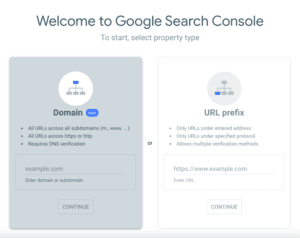
Pros:
- Free to use.
- Provides in-depth keyword performance and ranking data.
- Helps detect and fix indexing and crawl errors.
- Allows submission of sitemaps for faster indexing.
- Alerts users to security issues and manual penalties.
Cons:
- Can be overwhelming for beginners due to the technical data.
- Limited guidance on how to resolve certain issues.
- Doesn’t provide direct insights into competitor performance.
- Lacks advanced analytics compared to paid SEO tools.
Frequently Asked Questions
Why do SEO research tools often give different results?
SEO tools often provide varying results because each tool uses its own algorithms, data sources, and processing logic. Factors such as how often data is updated and the way metrics like search volume or backlinks are calculated can all lead to differences.
Some tools prioritize keyword data, while others may focus more on competitor analysis or site audits, resulting in diverse outputs. Use all these results as a guide, not a rule. Tools will help you, but the best content creation is human-driven.
What is the best tool for content writing?
There isn’t a one-size-fits-all answer, as the best tool for content writing depends on your specific needs. Tools like Grammarly are excellent for grammar and readability checks, while Hemingway Editor improves sentence clarity.
For generating ideas or drafting content, AI tools like Jasper, Rytr, or ChatGPT can be valuable. Combining multiple tools often yields the best results, helping you optimize content for both readability and SEO.
How much can I use AI in content creation?
AI can be used extensively in content creation, but it’s important to maintain a balance. AI tools like Jasper and ChatGPT are great for brainstorming, drafting, and outlining content, but human oversight is necessary to ensure the content aligns with your brand’s tone and accuracy.
While AI can speed up the content process, it’s essential to refine and optimize content manually to ensure quality and relevance. Use AI as a supportive tool, but don’t rely on it to create final drafts without human input.
Ace the SEO Content Creation Process
Leverage AI tools to produce high-quality content that engages and ranks well. Whether you’re optimizing for SEO, refining your writing, or enhancing visuals, these tools are essential for staying competitive.
Ready to take your content to the next level? Elevato’s team of experts can help you build a comprehensive strategy that integrates the best tools and practices.
